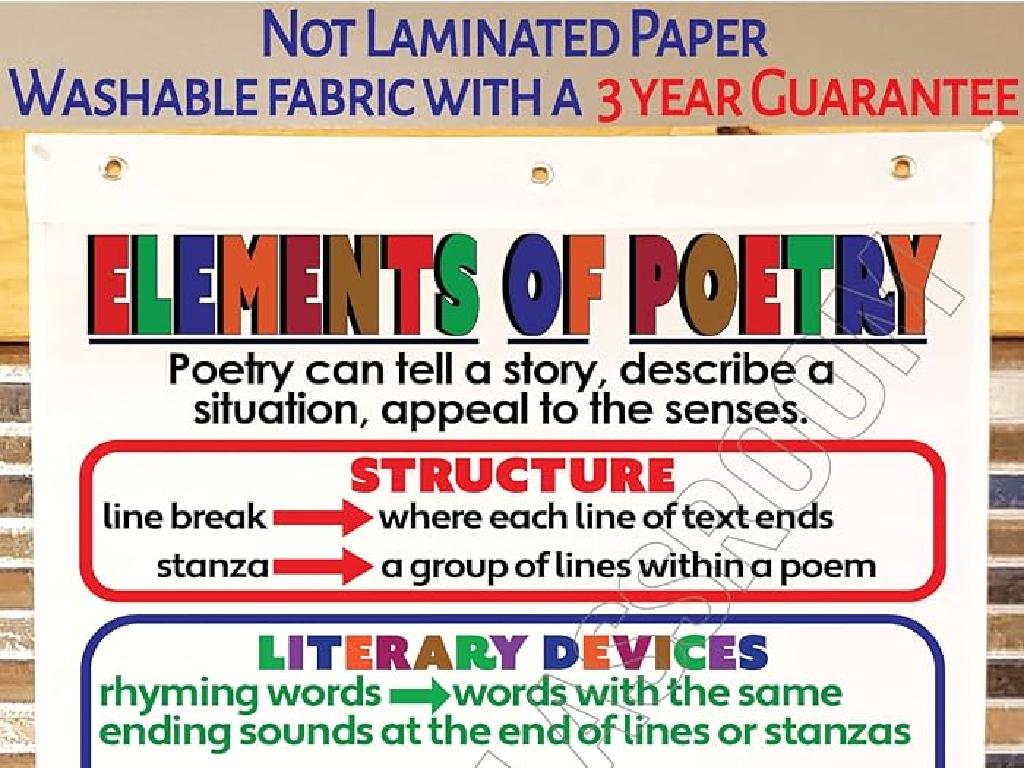Use Thesaurus Entries
Subject: Language arts
Grade: Eighth grade
Topic: Reference Skills
Please LOG IN to download the presentation. Access is available to registered users only.
View More Content
Mastering Reference Skills: The Thesaurus
– Importance of reference skills
– Essential for effective research and writing
– Overview of reference tools
– Tools like dictionaries and encyclopedias aid in understanding
– Focus on the Thesaurus
– A thesaurus provides synonyms and antonyms for word variety
– Enhancing vocabulary with synonyms
– Use a thesaurus to find alternative words and avoid repetition
|
This slide introduces students to the concept of reference skills, which are crucial for conducting thorough research and producing well-written work. It provides an overview of various reference tools available, such as dictionaries, thesauruses, and encyclopedias, each serving a unique purpose in the research process. The focus of today’s lesson is on using a thesaurus to find synonyms and antonyms, which can help students diversify their vocabulary and enhance their writing. Encourage students to practice looking up words they frequently use to find alternatives and to understand the subtle differences in word meanings. This exercise will not only improve their writing but also expand their language comprehension.
Exploring the Thesaurus: A Tool for Writers
– Define a thesaurus
– A book or database of synonyms and antonyms
– Purpose: synonyms and antonyms
– Helps find words with similar or opposite meanings
– When to use a thesaurus
– Use while writing to avoid repetition, express ideas clearly
– Enhancing vocabulary
– Broadens language skills, aids in precise expression
|
A thesaurus is an essential reference tool that provides a list of words grouped by similarity of meaning (synonyms) and opposition (antonyms). It serves a significant role in writing and speaking by helping to find alternative words to avoid repetition and make communication more effective. Encourage students to use a thesaurus when they want to find a more accurate or varied word choice to express their thoughts. Provide examples such as replacing ‘good’ with ‘excellent’ or ‘splendid’ to make their writing more engaging. Discuss the importance of choosing words that fit the context and not just using synonyms that sound sophisticated. This slide aims to show the practicality of a thesaurus in everyday writing and its impact on improving students’ vocabulary.
Mastering Thesaurus Entries
– Thesaurus entry components
– Entry word, part of speech, synonyms, antonyms
– Pronunciation guide usage
– Follow symbols and stress marks for correct pronunciation
– Synonyms vs. Antonyms
– Synonyms are similar, antonyms are opposite
– Differentiating synonyms
– Understand subtle differences in meaning
|
This slide aims to help students understand the structure and use of a thesaurus, which is a valuable tool for enhancing their writing. Begin by explaining the parts of a thesaurus entry, including the entry word, its part of speech, and lists of synonyms and antonyms. Emphasize the importance of the pronunciation guide, which helps with correct word pronunciation using symbols and stress marks. Discuss how synonyms can have similar meanings but may not be interchangeable due to nuances in connotation and context. Encourage students to use a thesaurus to expand their vocabulary and make more precise word choices in their writing. Provide examples of thesaurus entries and practice exercises to identify synonyms and antonyms, as well as to distinguish between synonyms.
Choosing the Right Synonym
– Synonyms and sentence context
– Context influences which synonym fits best
– Connotation vs. Denotation
– Words have ‘feelings’ (connotation) and ‘definitions’ (denotation)
– Practice with thesaurus entries
– Replace ‘happy’ with a synonym in a sample sentence
– Selecting appropriate synonyms
– Ensure the synonym maintains the sentence’s original meaning
|
This slide aims to teach students how to effectively use a thesaurus to choose synonyms that best fit the context of a sentence. Emphasize the importance of understanding both the connotation and denotation of words, as synonyms can have subtle differences in meaning that affect the sentence. Provide a practice example where students replace a common word with a more precise synonym from a thesaurus entry, ensuring that the new word is appropriate for the context. Encourage students to consider the overall tone and meaning of the original sentence when selecting synonyms. This exercise will enhance their vocabulary and improve their writing skills.
Thesaurus Treasure Hunt Activity
– Form small groups for the activity
– Each group gets a list of words
– Use a thesaurus to find synonyms
– A thesaurus is a reference book that lists words grouped together according to similarity of meaning.
– Discuss the nuances of synonyms
– Some synonyms might have slightly different connotations or uses.
|
This interactive class activity is designed to enhance students’ vocabulary and understanding of word nuances. By working in small groups, students will engage in a collaborative learning process. Provide each group with a diverse list of words and instruct them to use a thesaurus to find synonyms for each word. After the treasure hunt, facilitate a group discussion where students compare their findings and explore the subtle differences in meaning between synonyms. This will help them appreciate the richness of the English language and improve their writing skills. Possible words for the list could include ‘happy,’ ‘sad,’ ‘fast,’ and ‘think.’ Encourage students to consider context and appropriateness when selecting synonyms for their writing.
Thesaurus Mastery: Review & Practice
– Recap today’s key points
– Complete the thesaurus worksheet
– Find synonyms for words on the worksheet using a thesaurus
– Homework: Craft a paragraph
– Write a paragraph on any topic incorporating five new words
– Use five new synonyms
– Ensure the synonyms fit the context of your sentences
|
Begin with a brief review of the main points covered in today’s lesson, emphasizing the importance of using a thesaurus to expand vocabulary and improve writing. Distribute the worksheet for individual practice, where students will search for synonyms of given words. For homework, students should write a short paragraph on a topic of their choice, using at least five new synonyms learned from the worksheet. This will help reinforce their understanding of word choice and context. In the next class, ask volunteers to read their paragraphs and discuss the effectiveness of the synonyms they chose.
Conclusion: The Power of a Thesaurus
– Recap: Thesaurus enhances language
– A thesaurus helps find synonyms for precision and variety in writing.
– Use a thesaurus for future assignments
– Challenge yourself to improve essays and stories with new words.
– Open floor for questions
– Encourage exploration of synonyms
– Discovering new words can make writing more engaging and effective.
|
As we wrap up, remember that a thesaurus is a valuable tool for finding synonyms and antonyms to make your writing more precise and varied. Encourage students to utilize a thesaurus in their upcoming writing assignments to enhance their language skills. Now, let’s open the floor for any questions or clarifications students may have about using a thesaurus. This is also a good time to encourage them to explore and experiment with new words they find, which can help make their writing more engaging and effective. Provide examples of how a well-chosen word can change the tone or clarity of a sentence.




